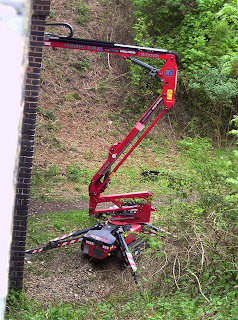BRIDGE 1 – STATION ROAD, BROADWAY
As you may know, bridge 1 at Broadway has been hit a number of times since it was repaired 2 years ago, at least 5 times and possibly even more. 3 of the vehicles involved were skip lorries - local ones at that - and two were curtain siders. Those are the ones we definitely know of. All forced themselves under the bridge, and out the other side, leaving a trail of ripped off bolts, ruined paintwork and torn electrical conduits.
Work started on 19th September 2016, to repair the effects of the several bridge strikes, and while the team was there, to point up some damage to the wing walls as well. The basic tasks are :-
1. Carry
out an inspection by a Professional Engineer, working from a lorry
mounted cherry picker to determine whether any
serious damage had been caused. Verbal indications today are that there
is none.
2. Raise
the conduits and cables that supply power to the low headroom warning
signs. The cables have been sheared off on 4 occasions despite being
higher that the headroom height stated.
3. Replace approximately 6 bolts and one rivet that had been sheared off.
4. Clean
and paint approximately 200 rivet and bolt heads and numerous parts of the
steel structure, which had had the paintwork scraped off by the various
lorry strikes.
 |
| Paintwork repair by the Broadway gang |
 |
| Wing wall repointing work |
 |
| A view of the work from the Evesham side |
BRIDGE 45 – SWINDON LANE, CHELTENHAM
At the other end of the line, our regular inspections of all our structures has revealed that work now needs doing to Swindon Lane bridge.
This bridge, number 45, is located south of Hunting Butts tunnel, where Swindon Lane crosses the line as it enters a cutting. At the other end of this cutting, the trackbed begins to touch Pittville Park, and that is the end of the actual trackbed that we own. Even though we don't run any trains down this last stretch of under a mile, we continue to be responsible for the bridges.
 |
| Swindon Lane bridge looking south |
A
very small but vital task was carried out on this bridge last week.
The bridge is constructed from 6 main steel girders running parallel
with the road, and between these the gaps are filled with long panels of
Jack arch brickwork. This brickwork is then covered with concrete to
form a level surface, which is waterproofed with asphalt before the road
materials are laid on top. The arch brickwork naturally has a
sidewards thrust, which tends to push the main girders apart. This
is prevented by the use of horizontal tie bars which link them all
together. Unfortunately 4 of these tie bars had corroded right through
and were missing, and another 3 had reduced from 7/8” diameter to less
than ½” diameter.
The
work required was to replace the missing ones and also remove and replace
the downgraded ones.
 |
| Cut out for a new tie bar |
Several of these passed through the very tough Jack
arch brickwork, which had to be cut out and made good.
Corrosion on the girders themselves is also evident.
 |
| New tie bar inserted |
A cherry picker was hired in to survey and repair the corrosion.
The cherry picker enabled Alastair Watson (of drainage gang fame) to take these pictures for us.
 |
| New tie bar in place. |
Finally, a picture of the bridge looking north towards Hunting Butts and CRC. The concrete bridge in front carries the footpath, as the original bridge is on the narrow side and carries traffic far heavier than imagined in 1906.
There is a weight restriction on it.
If you are interested in this piece of our trackbed, you can see more photographs of it here:




